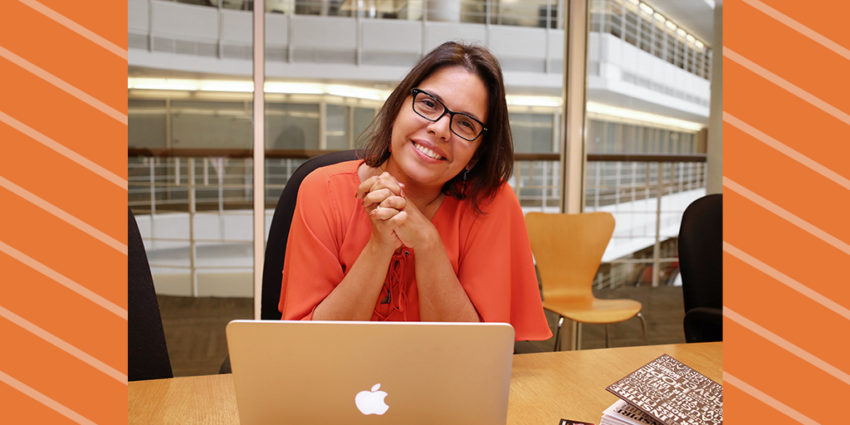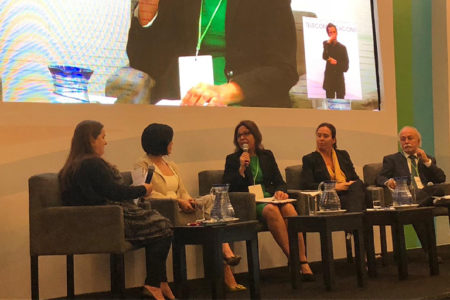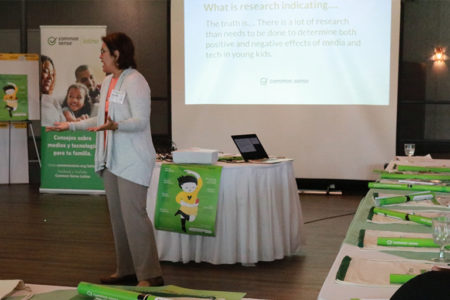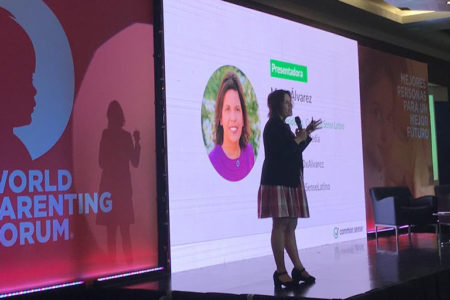
Share On Social!
Finding the right message has always been important to Maria Alvarez.
That determination is what led her to become a Vice President of Common Sense Media — a national, nonprofit communications network that is “dedicated to helping kids thrive in a rapidly changing world. Independent data on media and technology use and its impact on children’s physical, emotional, social, and intellectual development.”
Alvarez, founded, designed, and continues to lead Common Sense Latino, the Spanish-language-only program of that organization, which creates content for that community specifically.
“I’ve been on the ground and in the trenches with these families for over 10 years,” Alvarez said. “So, I know how willing Latino families are in embracing technology, and you see that in the data. At the same time, I noticed the fear of moms and dads that see their kids living in this 24/7-connected world.
“I created Common Sense Latino thinking of them.”
Passion for Latino Advocacy Flourishes from Hard Work
Born in Venezuela, Alvarez found a connection to story at an early age.
“I remember my mom telling me that I have always been into reading and writing,” she said. “I have memories of my grandmother—we were very close—she would sit down with me and have me write all of her holiday cards. Honestly, it was not hard work because I enjoyed it.”
That storytelling passion began to blossom, even in areas that assisted her family’s business.
Growing up, Alvarez worked with her parents, the owners of a local flower shop. Customers would go to her and request she write the notes that would accompany each bundle, according to Alvarez.
Those talents led her to become a first-generation college graduate.
Moreover, during her time in school, she began her career working in the journalism industry. After spending years in Latin America’s journalism network, Alvarez was offered her first big break.
“A friend of mine told me that CNN bureau in Caracas was looking for a producer,” she said. “It was really moving to work with international outlets.”
Alvarez moved to the U.S. in 2004 and began working with some of the country’s largest news networks. It brought her in new, exciting directions.
But it took a frightening family situation to push her toward where she is today, at Common Sense Latino.
A ‘Wakeup Call’ to Advocate for Latino Families
Her current journey, aiming to help others better understand the harms media poses, began for Alvarez when her niece experienced a traumatic experience online.
“She started to spend a lot of time in Cyber Cafés—places where you go and pay to use the internet in Latin America—and started to change her behavior,” Alvarez said. “My sister begins telling me, ‘hey, I’m seeing a lot of changes.’ Then, she calls me one day, crying, and tells me that that [my niece] was about to join a cult, and her initiation ceremony was supposed to be [later that week]. We found out that she was supposed to go to a cemetery for that ceremony. She was 11 years old at that point.
“It was a wakeup call.”
Before that occurrence, Alvarez notes that, like many, she didn’t have a full understanding of what mass media offers, especially to the young.
“I didn’t really have to think about how the evolution of the Internet and these online platforms could have an effect on kids. What happened to my niece forced me to see that.”
It was while looking for resources to help support her family in need that she discovered Common Sense Media. Alvarez—a new mother herself—attended one of the organization’s first conferences on online safety with her 6-month-old son.
At that time, she was working as a freelance journalist but kept in touch with a few Common Sense advocates.
Not long after that initial conference, the organization came to Alvarez, asking for her guidance in expanding their advocacy efforts into the Latino community. She began developing resources for those efforts, thinking she was only helping out an organization in need.
“I wrote those pages out of my media experience and also what I had lived through with my niece — the anxiety, the fear,” Alvarez said.
Still, the leaders at Common Sense found Alvarez’s work to be so impactful that it led to a fruitful development — Common Sense Latino.
Getting Common Sense Latino Off the Ground
Primarily, Alvarez wanted to make her new project one that heard the thoughts and ideas of those in her community.
“I started by doing some parent workshops and presentations, but I spent a lot of time listening,” Alvarez said. “Listening to the families — their fears, concerns, but also their hopes. Many families, especially low-income Latino families, see technology as a way for their kids, educationally, for their kids to do better.”
Common Sense Latino began developing relationships with stakeholders in the field as well as creating resources for others that provide tools in combating harmful media.
Moreover, the group works with educators to implement their resources in the classroom.
“Through our Common Sense efforts in schools across the country, we currently serve more than 50% of public schools in the US, and we are expanding our Latino efforts,” Alvarez said. “One out of four kids in public schools are Latino, and in states like California and Texas, Latino kids make up more than 50% of students in public schools.”
She notes that this work aims to create a better future for the next generation of technology users.
“[This all] started because of all of the challenges, but also all of the opportunities that are present If [children] can learn how to use technology in a safe, smart, and balanced way,” Alvarez said. “That’s the mission.”
Still, that work is bolstered by the organization’s desire to promote the community in which they serve — providing all users with an insight into the culture of the Latino community.
“Common Sense Latino blends culture and language, which [provides] a very different offering as we are not only doing translations, [but we] we are acknowledging and celebrating the culture and heritage of our users,” Alvarez said. “It was a very strategic decision that Common Sense made as an organization because the senior executive team understood that given the demographic changes in the US, having a robust Latino program will increase the impact of the organization.”
Alvarez Helps Keep Common Sense Latino on Continual Upward Trajectory
While Common Sense Latino offers parents and educators tools to help create a healthier mass media culture, Alvarez hopes these resources provide more than just that.
“This project is not just about Spanish-language content,” she said. “This is about embracing and celebrating the Latino culture. We have content in the Latino section of our website that isn’t just for Latino families. We have message boards, free apps, and more in English. We have a list of exciting Latino movies. 
“We have created content over the past five years that is not just bilingual, but they are also the cultural needs of Latino families.”
More than anything else, Alvarez notes that this work is for the families in the Latino community. She says she hopes the information Common Sense Latinos spurs on people to take responsibility for the consequences of their actions, unintentional or not.
“When we talk about wellbeing, everyone needs to be on the same page,” Alvarez said. “Because we’ve found that parents are teaching this bad behavior — in fact, 73% of them are going to bed with their phones. Children do what we do.
“No matter how many lectures we give, it does not matter. What really matters is how you model the things for your kids.”
Explore More:
EducationBy The Numbers
142
Percent
Expected rise in Latino cancer cases in coming years
This success story was produced by Salud America! with support from the Robert Wood Johnson Foundation.
The stories are intended for educational and informative purposes. References to specific policymakers, individuals, schools, policies, or companies have been included solely to advance these purposes and do not constitute an endorsement, sponsorship, or recommendation. Stories are based on and told by real community members and are the opinions and views of the individuals whose stories are told. Organization and activities described were not supported by Salud America! or the Robert Wood Johnson Foundation and do not necessarily represent the views of Salud America! or the Robert Wood Johnson Foundation.



